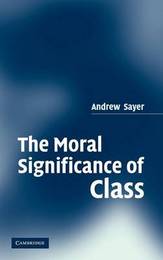
|
The Moral Significance of Class
Hardback
Main Details
| Title |
The Moral Significance of Class
|
| Authors and Contributors |
By (author) Andrew Sayer
|
| Physical Properties |
| Format:Hardback | | Pages:256 | | Dimensions(mm): Height 229,Width 152 |
|
| ISBN/Barcode |
9780521850896
|
| Classifications | Dewey:305.5 |
|---|
| Audience | | Professional & Vocational | | Tertiary Education (US: College) | |
|---|
|
Publishing Details |
| Publisher |
Cambridge University Press
|
| Imprint |
Cambridge University Press
|
| Publication Date |
12 May 2005 |
| Publication Country |
United Kingdom
|
Description
The Moral Significance of Class analyses the moral aspects of people's experience of class inequalities. Class affects not only our material wealth but our access to things, relationships, and practices which we have reason to value, including the esteem or respect of others and hence our sense of self-worth. It shapes the kind of people we become and our chances of living a fulfilling life. Yet contemporary culture is increasingly 'in denial' about class, finding it embarrassing to acknowledge, even though it can often be blatantly obvious. By drawing upon concepts from moral philosophy and social theory and applying them to empirical studies of class, this fascinating and accessible study shows how people are valued in a context in which their life-chances and achievements are objectively affected by the lottery of birth class, and by forces which have little to do with their moral qualities or other merits.
Author Biography
Andrew Sayer is Professor of Social Theory and Political Economy at the Department of Sociology, Lancaster University. His publications include Microcircuits of Capital (1988, with K. J. Morgan), Method in Social Science (1992), The New Social Economy (1992, with R. A. Walker), Radical Political Economy: A Critique (1995), and Realism and Social Science (2000), and over eighty articles.
Reviews'It is stimulating and insightful both in the overall thrust of its argument and the details of its analysis ... a book of bread relevance to anyone interested in sociological theory, the normative dimensions of culture, and inequality.' American Journal of Sociology
|